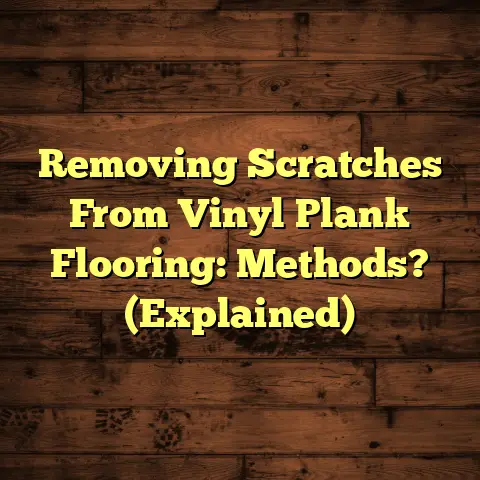1500 Square Feet Flooring Cost (Explained)
Installing hardwood flooring is a significant investment that can enhance the beauty and value of your home. However, understanding the costs involved is crucial for making informed decisions. This comprehensive guide breaks down the various factors that influence hardwood flooring installation costs for a 1500-square-foot area, while also comparing it to alternative flooring options.
Major Cost Factors Impacting Hardwood Flooring Installation
When estimating the cost of installing hardwood flooring, several key factors play a role:
1. Area Size
The size of the area to be floored directly impacts material and labor costs. For a 1500-square-foot space, you can expect a higher total cost than smaller areas due to the bulk purchase of materials and increased labor hours.
2. Hardwood Type
Different types of hardwood have varying costs. Common species include:
- Oak: $3 to $7 per square foot
- Maple: $5 to $10 per square foot
- Cherry: $6 to $12 per square foot
- Walnut: $8 to $15 per square foot
3. Labor Costs
Labor costs can vary significantly based on location and the complexity of the installation. On average, you may expect to pay between $3 to $8 per square foot for professional installation.
4. Additional Considerations
- Floor Removal: If you need to remove existing flooring, this can add $1 to $3 per square foot.
- Subfloor Replacement: Issues with the subfloor can lead to additional costs ranging from $1 to $5 per square foot.
- Material Grade: Higher-grade hardwoods will cost more upfront but may offer better durability.
- Room Size/Layout: Larger rooms or those with complex layouts may incur higher labor charges.
- Installation Type: Standard nail-down installations are generally cheaper than custom designs like herringbone or parquet.
Cost Breakdown for 1500 Square Feet
Here’s a detailed breakdown of potential costs for installing hardwood flooring in a 1500-square-foot area:
| Cost Factor | Low Estimate | High Estimate |
|---|---|---|
| Hardwood Material | $4,500 ($3/sq ft) | $22,500 ($15/sq ft) |
| Labor | $4,500 ($3/sq ft) | $12,000 ($8/sq ft) |
| Floor Removal | $1,500 ($1/sq ft) | $4,500 ($3/sq ft) |
| Subfloor Replacement | $1,500 ($1/sq ft) | $7,500 ($5/sq ft) |
| Total Estimate | $13,500 | $46,500 |
Comparing Hardwood vs. Alternative Flooring Options
When considering the investment in hardwood flooring, it’s important to compare it against other popular flooring choices:
1. Laminate Flooring
- Cost: $1 to $5 per square foot
- Pros: More affordable, easier to install.
- Cons: Less durable and harder to refinish.
2. Vinyl Flooring
- Cost: $2 to $7 per square foot
- Pros: Water-resistant, wide range of styles.
- Cons: Can look less authentic than hardwood.
3. Carpet
- Cost: $2 to $7 per square foot (plus padding)
- Pros: Soft underfoot, good insulation.
- Cons: Harder to clean and maintain; not as durable as hardwood.
Signs That Hardwood Floors Need Replacement
Recognizing when it’s time to replace your hardwood floors is essential:
- Severe Scratches and Gouges: If your floors are deeply damaged beyond refinishing.
- Warping or Buckling: This can indicate moisture damage.
- Fading and Discoloration: Extreme sun exposure can cause irreparable fading.
- Persistent Odours: A musty smell may indicate underlying issues.
Refinishing vs. Replacement
Deciding whether to refinish or replace your hardwood floors often depends on the extent of the damage:
- Refinishing is ideal if floors are scratched but structurally sound.
- Replacement is necessary when floors have severe damage or are outdated.
Pros and Cons of Hardwood Flooring
Pros
- Aesthetic appeal and natural beauty.
- Durable and long-lasting with proper care.
- Increases property value.
Cons
- Higher initial cost compared to alternatives.
- Susceptible to water damage if not properly maintained.
- Requires regular maintenance like refinishing.
Professional Installation vs. DIY
While DIY installation can save money, it comes with its considerations:
Cost Differences
- Professional Installation: $3 to $8 per square foot.
- DIY Installation Tools: Expect to spend around $200 to $500 on tools if you don’t already own them.
Skills Required
DIY projects require knowledge of flooring installation techniques, subfloor preparation, and finishing. Improper installation can lead to costly mistakes later.
Questions to Ask Hardwood Flooring Contractors
When interviewing contractors for your project, consider asking:
- What types of hardwood do you recommend for my project?
- How long will the installation take?
- Can you provide references from past clients?
- What is included in your estimate?
- Do you offer any warranties on your work?
Hardwood Floor Care and Maintenance Tips
To maximize the longevity of your hardwood floors:
- Regular Cleaning: Sweep or vacuum regularly to prevent dirt accumulation.
- Use Proper Cleaners: Avoid harsh chemicals; use products specifically designed for hardwood.
- Control Humidity Levels: Maintain humidity between 30% and 50% to prevent warping.
- Place Mats at Entrances: This helps reduce dirt and moisture tracked onto your floors.
Conclusion
Investing in hardwood flooring can enhance the beauty and value of your home while offering durability when properly maintained. By understanding the various factors that influence costs and carefully evaluating your options, you can make informed decisions that suit your budget and lifestyle. Whether choosing professional installation or embarking on a DIY project, ensuring quality materials and craftsmanship will lead to a successful flooring project that you’ll enjoy for years to come.





